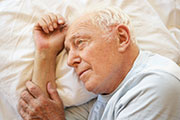
MONDAY, June 8, 2015 (HealthDay News) — Non-drug therapy can help adults who lie awake in bed most nights, a review of research finds.
Instead of popping a sleeping pill, someone with insomnia might benefit from techniques associated with “cognitive behavior therapy,” researchers said after reviewing 20 prior studies.
Cognitive behavior therapy is a type of talk therapy where the goal is to help people change their thought patterns and learn better responses to situations.
Individuals who engaged in the sleep-enhancing practices fell asleep 20 minutes sooner, on average, and slept 30 minutes more each night, the investigators said.
“Effects appeared to continue over time and to result in an improvement in symptoms and general well-being,” said review lead author Dr. James Trauer, a sleep physician with the Melbourne Sleep Disorders Center in Australia.
Up to 15 percent of adults worldwide regularly have sleep difficulties, which can lead to anxiety, depression and even type 2 diabetes, the researchers reported in background notes. Sleeping pills and other medications, while widely marketed, can cause dependence and troublesome side effects, they added.
Each of the 20 studies assessed at least three of five sleep-enhancing techniques used in cognitive behavior therapy. The studies included adults with insomnia but no medical or psychiatric problems that disrupt sleep. For example, no one with sleep apnea or depression was included.
For people without those problems, the review suggests that cognitive behavior therapy can help, “provided you are prepared to work hard at it and change your behaviors and attitudes to sleep,” Trauer said.
“Before the treatment, the average time to get to sleep was just under an hour and the average time awake in bed after initially getting to sleep was about an hour and a quarter,” Trauer said. “Time to get to sleep was improved by about 20 minutes, and time awake after initially getting to sleep decreased by about half an hour. We think these are significant improvements.”
Also, he said, the proportion of time in bed spent asleep improved by about 10 percentage points, he said. “That represents a marked improvement as well and, most importantly, people felt significantly better after the treatment,” he added.
For their analysis, published in the June 9 issue of Annals of Internal Medicine, the researchers drew statistics from 19 of the 20 studies. More than 1,160 patients, with an average age of 56, were involved in all. Almost 65 percent of participants were women.
People with insomnia get stressed by lying in bed, Trauer explained. Essentially, the therapeutic treatments “short-circuit” that process, he said.
The essential elements include talk therapy aimed at reducing anxiety and negative thoughts about sleeplessness; “stimulus control” to boost the relationship between bed and sleep; and restricting overall time spent in bed. Also, “sleep hygiene” addresses good bedtime habits, and “relaxation techniques” are taught to minimize muscle tension and mental distractions.
“One major advantage is that [cognitive therapy] involves teaching skills to patients that they can then maintain lifelong and use whenever symptoms recur,” Trauer said.
Charles Morin, a professor at Laval University in Quebec City, Canada, praised the research. “This is additional evidence that cognitive behavioral therapy works, even for people who have severe and chronic insomnia,” said Morin, author of an accompanying journal editorial.
There are challenges, however. Although patients are generally receptive to these non-medical approaches, Morin said, “it will take more time than just using a sleeping pill.” At least four to six weekly visits to get training may be required, he said. But, he added, that’s not much for patients who may have suffered for more than a decade from poor sleep.
“We’re talking about very persistent insomnia,” he said. “They’ve gone to many doctors and tried many medications and don’t know what else to do.”
Morin estimated the cost of cognitive training at $600 to $800. The researchers said training in these techniques is not available everywhere, but there are books that can be used instead.
More information
For more about non-medical treatment for sleep problems, see the National Sleep Foundation.
Copyright © 2026 HealthDay. All rights reserved.

